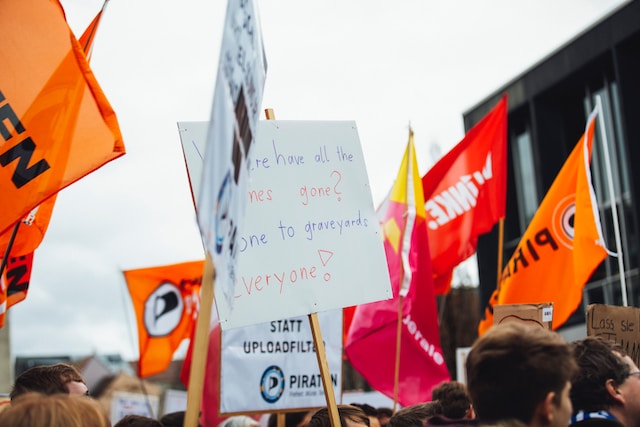Welcome to the world of dystopian fiction! A genre that has been serving us with its eerie and thought-provoking stories for ages. From George Orwell’s “1984” to Suzanne Collins’ “The Hunger Games,” dystopian tales have always managed to capture our attention while painting a picture of a hopeless future, where humanity is on the brink of extinction. However, what if I told you that these stories are more than just entertainment? Dystopian fiction can be used as a powerful tool in understanding and confronting America’s political nightmares. Let’s explore this fascinating topic together!
Dystopian fiction has a long and important history in American literature
Dystopian fiction has a long and fascinating history in American literature. The genre emerged in the 19th century, with works like Edward Bellamy’s “Looking Backward” and Jack London’s “The Iron Heel.” However, it was not until the early 20th century that dystopian fiction gained mainstream popularity.
One of the earliest examples is Yevgeny Zamyatin’s “We,” which inspired George Orwell to write his iconic novel “1984.” Dystopian themes continued to appear throughout the rest of the 20th century, with notable works including Ray Bradbury’s “Fahrenheit 451” and Margaret Atwood’s “The Handmaid’s Tale.”
Dystopian stories have always been a reflection of society’s fears and anxieties. They highlight issues such as government surveillance, totalitarianism, environmental destruction, social inequality and dehumanization – all problems that are still relevant today.
Although often bleak in nature, these stories offer valuable insights into human behavior. By examining fictional characters’ reactions to oppressive regimes or disastrous circumstances we can learn about our own capacity for resistance or submission when faced with adversity.
Dystopian fiction has played an essential role within American literature by offering readers a glimpse into what could happen if we fail to address societal challenges. These narratives serve as cautionary tales while also encouraging us to think critically about our world and strive towards creating a better future.
Dystopian fiction has often been used to explore America’s political nightmares
Dystopian fiction has always been a powerful medium for exploring political nightmares, and America is no exception. From George Orwell’s “1984” to Margaret Atwood’s “The Handmaid’s Tale,” dystopian works have often depicted oppressive regimes that bear eerie similarities to the current American political landscape.
In many ways, dystopian fiction serves as a warning of what could happen if society fails to address issues like totalitarianism, fascism, and authoritarianism. By depicting these societies in stark detail, authors help us understand the dire consequences of failing to stand up against such forces.
Moreover, dystopian literature often highlights the importance of individual freedom and resistance against oppression. This theme is particularly relevant in today’s politically charged climate where civil liberties are being eroded at an alarming rate.
Through their vivid imagery and unsettling portrayals of dark futures, dystopias provide us with a glimpse into what our own society could become if we fail to take action against tyranny. As such, they serve as an essential tool for understanding the complex challenges facing modern-day America.
Dystopian fiction is an excellent tool for understanding the current state of America
Dystopian fiction has the power to reveal underlying truths about a society, including its political nightmares. By examining dystopian themes and exploring possible futures, we can gain insight into our current state of affairs.
In America, dystopian literature has been particularly insightful in understanding contemporary politics. From George Orwell’s “1984” to Margaret Atwood’s “The Handmaid’s Tale,” these works offer critiques of American society that are as relevant now as they were when they were written.
One way dystopian fiction helps us understand America is by providing a warning against authoritarianism. In many dystopic worlds, governments have unchecked power and control over citizens’ lives. This is a reminder of the importance of protecting individual freedoms and curbing government overreach.
Additionally, dystopian fiction highlights issues such as social inequality and environmental degradation that are still prevalent in America today. These novels serve as cautionary tales for what could happen if we don’t address these problems head-on.
Reading dystopian fiction offers a unique perspective on current events while also providing an opportunity for critical reflection on our own values and beliefs. It encourages us to confront uncomfortable truths about ourselves and our society so that we can work towards building a better future for all Americans.
Dystopian fiction can be used to help confront America’s political nightmares
Dystopian fiction can serve as a powerful tool for confronting America’s political nightmares. In these stories, we see the consequences of letting our democracy slip away or giving too much power to those who don’t deserve it. By imagining worst-case scenarios, we can better understand what is at stake and take action to prevent them from becoming reality.
Through dystopian fiction, readers can explore themes like authoritarianism, censorship, and propaganda that are all too relevant in today’s political climate. These stories provide a lens through which we can examine our own society and ask important questions about how power is distributed and used.
Moreover, dystopian fiction allows us to empathize with characters living under oppressive regimes and inspires us to fight against injustices in our own world. It shows us that even when things seem hopeless, there is always hope for resistance and revolution.
By reading dystopian fiction and discussing its implications with others, we can create a more informed citizenry that is better equipped to confront America’s political nightmares head-on. We must never forget the importance of speaking truth to power – both in our actions as citizens and in the art we consume.
In short, dystopian fiction helps us confront America’s political nightmares by providing insight into possible futures if certain paths are taken; allowing readers to examine their own society on important issues such as authoritarianism; inspiring empathy towards oppressed people; offering hope for resistance & revolution regardless of how bleak things may appear; creating an informed citizenry who are more prepared for action against injustice while still being entertained through literature!
Conclusion
Dystopian fiction has a crucial role in understanding and confronting America’s political nightmares. As we have explored, this genre offers powerful insights into the consequences of unchecked power, societal decay, and authoritarianism. It allows us to see our world through a different lens and encourages critical thinking about our own society.
Through dystopian fiction, we can also find hope for change by examining the choices that characters make in their fight against oppression. By doing so, we can learn from their successes and failures as well as reflect on how we can create a better future for ourselves.
Therefore it is necessary to acknowledge the importance of such literature not only as an art form but also as a tool for reflection and action. The lessons learned from these books are applicable to contemporary politics where democracy seems threatened at every turn.
So let us continue reading dystopian novels with both caution and optimism – caution because they remind us of what could happen if we don’t act; optimism because they show us that even in the darkest times there is always hope for change.




